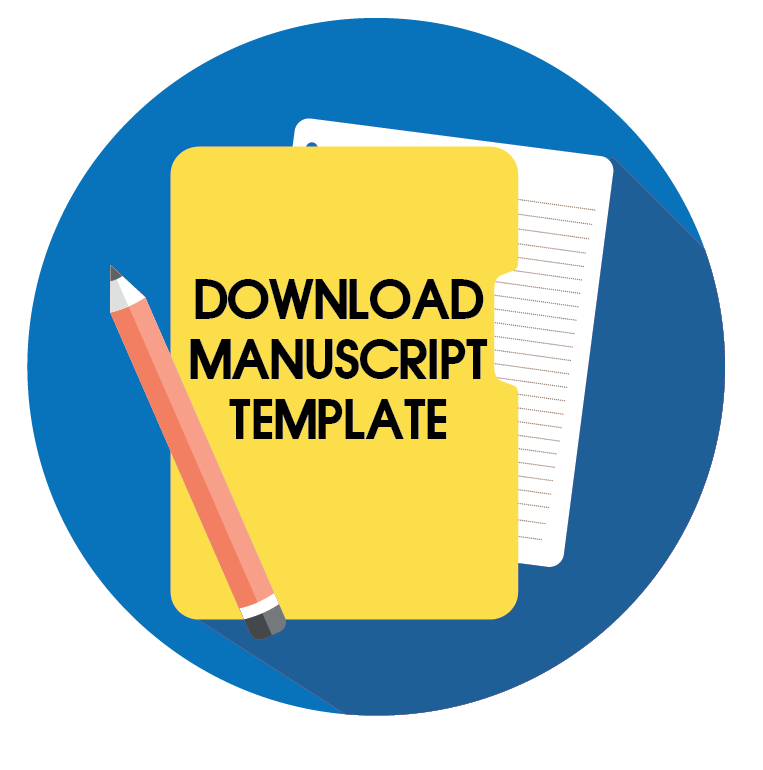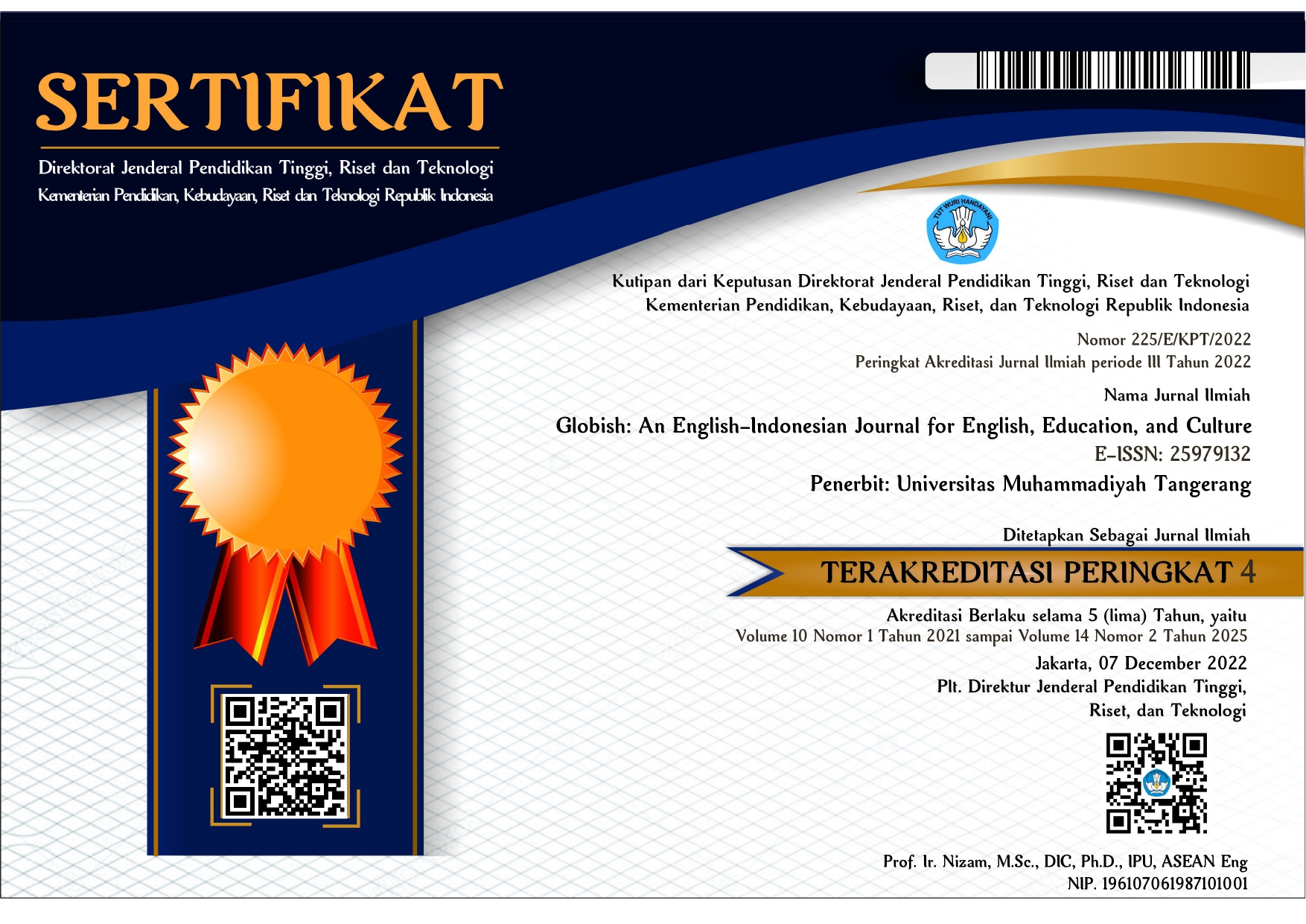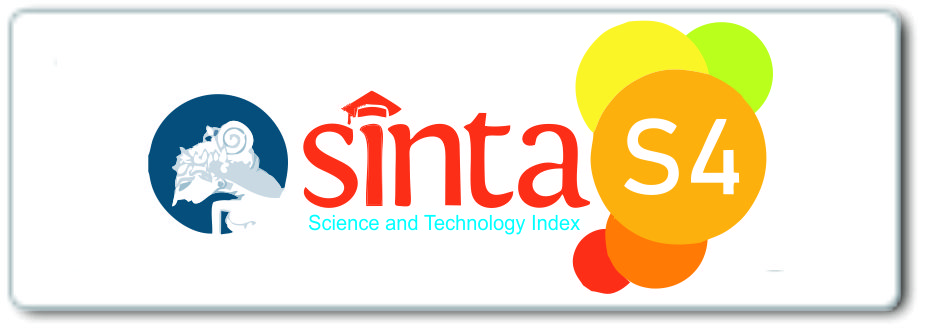THE EFFECT OF BOGGLE GAMES ON THE VOCABULARY MASTERY OF THE SEVENTH GRADE STUDENTS' AT MTS. NURUL HIKMAH
Abstract
Abstract
The research is aimed to investigate whether there is an effect of the Boggle game on vocabulary mastery of seventh-grade students at MTs. Nurul Hikmah. The design used was quasi-experimental method with Nonequivalent control group design. The subject of population in this research is seventh-grade students of MTs Nurul Hikmah. The sample of this research were 60 students, who were classified into 30 students of experimental class and 30 students of controlled class. The technique of collecting data with used the research instrument was a test consisting of a pre-test and post-test. The results of thisresearch stated that the used of Boggle games in learning vocabulary affected students' vocabulary mastery. This can be seen from the t-test results of pre-test and post-test at a significance level of 5% (0.05) alpha and degrees of freedom of 2.00, where the t-count of pre-test is higher than the t-table (2.03 > 2.00) with the average pre-test score of the experimental class was higher than the average pre-test score of the control class (49.47 > 42.60) and the t-count of post-test is higher than the t-table (5.75> 2.00) with the average post-test score of the experimental class was higher than the average pre-test score of the control class (83.50 > 73.10). It can be concluded that there is significant effect of Boggle game on the seventh grade students’ vocabulary mastery at MTs. Nurul Hikmah. It means that the Boggle game is effective in learning vocabulary mastery for the seventh-grade students of MTs Nurul Hikmah. By using the Boggle game, the teaching and learning process becomes more interesting.
Key words: Boggle Game, Vocabulary Mastery.
Full Text:
PDFReferences
Alqahtani, M. (2015). The Importance of Vocabulary in Language Learning and How to be Taught. International Journal of Teaching and Education. Vol. III. p. 22.
Arumningsih, Dwi. (2017). The Effectiveness of Using Spelling Bee Games in Teaching Vocabulary Mastery at the Seventh Grade Students of Mts Al-Hidayah Nusawungu in the Academic Year 2016/2017. Purworejo: Purworejo Muhammadiyah University.
Fauziah, Amanda. (2018). The Use of Boggle Game to Improve Students Vocabulary in Writing Descriptive Text. Pontianak: University Tanjungpura Pontianak.
Caputo, D., & Dunning, D. (2004). What you don’t know: The role played by errors of omission. Journal of Experimental Social Psychology. p. 5.
Dickman, B. (2013). Problem Solving Strategies in Boggle-Like Game. Word Ways. p. 66.
Dowdy, S., Weardon, S., & Chilko, D. (2004). Statistics for research. Canada: John Wiley & Sons, Inc., Hoboken, New Jersey.
Gu, P. Y. (2013). Vocabulary Learning in a Second Language: Person, Task, Context and Strategies. The Electronic Journal for English as a Second Language.
Harmer, J. (2001). The Practice of English Language Teaching (3rd Ed.). London: Longman.
Hermansen, O., Hvring, T. E., & Killerud, W. (2013, March Wednesday). Different interaction styles when configuring a fiducial in a reactivision application. Faculty of Computer Science. p. 4.
Hiebert, E. H., & Kamil, M. L. (2005). Teaching and Learning Vocabulary: Bringing Research to Practice. Lawrence Erlbaum Associates.
Hughes, A. (2003). Testing for Language Teachers. Cambridge: Cambridge University Press.
Luis, Villalobos. (2010). Rubrics presentation. From Slideshare net. https://www.slideshare.net/lavillal/rubrics-presentation. (accessed on April, 5th 2020).
McCarthy, M., O'Keeffe, A., & Walsh, S. (2010). Vocabulary matrix: understanding, learning, teaching. Heinle, Cengage Learning.
Needleman, J. (2013). Boggle Logic Puzzles: Minimal Solutions. The College Mathematics Journal. Vol. 44. p. 293.
Riadi, E. (2015). Metode Statistika Prametrik & Nonprametrik. Tangerang: Pustaka Mandiri.
Richards, J. C., & Renandya, W. A. (2002). Methodology in Language Teaching: An Anthology of Current Practice. New York: Cambridge University Press.
Suciati, Alipi. (2010). The Effectiveness of Using Hidden Word Game to Improve Vocabulary Mastery of the Seventh Grade Students of SMPN I Munjungan. Tulungagung: State Islamic College Of Tulungagung
Sugiyono. (2016). Metode Penelitian Kuantitatif, Kualitatif, dan R&D. Bandung: Alfabeta.
Thornbury, S. (2002). How to Teach Vocabulary. London: Longman.
Toma, I., Alexandru, C. E., Dascalu, M., Dessus, P., & Matu, S. T. (2017). Semantic Boggle: A Game for Vocabulary Acquisition. Springer International Publishing. p. 607.
Ur, P. (2009). A Course in Language Teaching: Practice of Theory (Cambridge Teacher Training and Development). Cambridge: Cambridge University Press.
Usman, U. (2016). Assessing And Analysing Students’ Vocabulary. Atlantis Press. p. 277.
Vancouver. (2011). An Exploratory Study of Mobile Collaborative Learning in Developing Regions. ACM Classification Keywords. p. 4.
Wikipedia. (2020). Boggle. From Wikipedia, the free encyclopedia: https://en.wikipedia.org/wiki/Boggle. (accessed on March, 21th 2020).
WordDive, T. (2013). Words Will Get You Far: Why Is Vocabulary Acquisition So Important In Second And Foreign Language Learning?: https://www.worddive.com/blog/words-will-get-you-far-why-is-vocabulary-acquisition-so-important-in-second-and-foreign-language-learning/.pdf (accessed on March, 20th 2020)
DOI: http://dx.doi.org/10.31000/globish.v10i1.3872
Article Metrics
Abstract - 18896 PDF - 1403Refbacks
- There are currently no refbacks.
Globish
Program Studi Pendidikan Bahasa Inggris
Fakultas Keguruan dan Ilmu Pendidikan
Universitas Muhammadiyah Tangerang
Jl. Perintis Kemerdekaan I/33, Cikokol
Kota Tangerang, Indonesia
e-mail: globish_journal@umt.ac.id
Globish (p-ISSN: 2301-9913 | e-ISSN: 2301-9913) is licensed under a Creative Commons Attribution-ShareAlike 4.0 International License.









